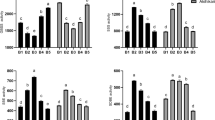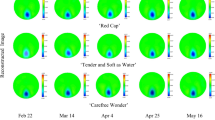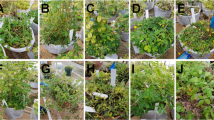Abstract
This protocol describes a simple means of measuring the starch content of plant tissues by solubilizing the starch, converting it quantitatively to glucose and assaying the glucose. Plant tissue must initially be frozen rapidly to stop metabolism, then extracted to remove free glucose. Starch is solubilized by heating, then digested to glucose by adding glucan hydrolases. Glucose is assayed enzymatically. The method is more sensitive and accurate than iodine-based protocols, and is suitable for tissues that have a wide range of starch contents. Measurements on multiple samples can be completed within a day.
This is a preview of subscription content, access via your institution
Access options
Subscribe to this journal
Receive 12 print issues and online access
$259.00 per year
only $21.58 per issue
Buy this article
- Purchase on Springer Link
- Instant access to full article PDF
Prices may be subject to local taxes which are calculated during checkout
Similar content being viewed by others

References
Zeeman, S.C., Northrop, F., Smith, A.M. & ap Rees, T. A starch-accumulating mutant of Arabidopsis thaliana deficient in a chloroplastic starch-hydrolysing enzyme. Plant J. 15, 357–365 (1998).
Hovenkamp-Hermelink, J.H.M. et al. Rapid estimation of the amylose/amylopectin ratio in small amounts of tuber and leaf tissue of the potato. Potato Res. 31, 241–246 (1988).
Carpita, N. & Kanabus, J. Extraction of starch by dimethylsulfoxide and quantitation by enzymatic assay. Anal. Biochem. 161, 132–139 (1987).
Kaplan, F. & Guy, C.L. RNA interference of Arabidopsis β-amylase8 prevents maltose accumulation upon cold shock and increases sensitivity of PSII photochemical efficiency to freezing stress. Plant J. 44, 730–743 (2005).
Stitt, M., Bulpin, P.V. & ap Rees, T. Pathways of starch breakdown in photosynthetic tissues of Pisum sativum. Biochim. Biophys. Acta 544, 200–214 (1978).
Kunst, A., Draeger, B. & Ziegenhorn, J. in Methods in Enzymatic Analysis 3rd edn. Vol. 6 (ed. Bergmeyer, H.U.) 163–171 (Chemie, Weinheim, Germany, 1988).
Bieleski, R.L. The problem of halting enzyme action when extracting plant tissues. Anal. Biochem. 9, 431–442 (1964).
Stitt, M., Wirtz, W. & Heldt, H.W. Metabolite levels in the chloroplast and extrachloroplast compartments of spinach protoplasts. Biochim. Biophys. Acta 593, 85–102 (1980).
Weiner, H., Heldt, H.W. & Stitt, M. Subcellular compartmentation of pyrophosphate and pyrophosphatase in leaves. Biochim. Biophys. Acta 893, 13–21 (1987).
Acknowledgements
We thank the many members of our laboratories, past and present, who have contributed to troubleshooting and streamlining this protocol. The John Innes Centre is supported by a core strategic grant from the Biotechnology and Biological Sciences Research Council, UK. S.C.Z. is partly supported by an EMBO Young Investigators Award.
Author information
Authors and Affiliations
Corresponding author
Ethics declarations
Competing interests
The authors declare no competing financial interests.
Rights and permissions
About this article
Cite this article
Smith, A., Zeeman, S. Quantification of starch in plant tissues. Nat Protoc 1, 1342–1345 (2006). https://doi.org/10.1038/nprot.2006.232
Published:
Issue Date:
DOI: https://doi.org/10.1038/nprot.2006.232
This article is cited by
-
Fast screening method to identify salinity tolerant strains of foliose Ulva species. Low salinity leads to increased organic matter of the biomass
Journal of Applied Phycology (2024)
-
Acetylcholine Alleviates Salt Stress in Zea mays L. by Promoting Seed Germination and Regulating Phytohormone Level and Antioxidant Capacity
Journal of Plant Growth Regulation (2024)
-
Effects of Biofertilizers and Potassium Sulfate On Nutrients Uptake and Physiological Characteristics of Maize (Zea mays L.) Under Drought Stress
Journal of Crop Health (2024)
-
Mechanisms of metabolic adaptation in the duckweed Lemna gibba: an integrated metabolic, transcriptomic and flux analysis
BMC Plant Biology (2023)
-
Salicylic acid metabolism and signalling coordinate senescence initiation in aspen in nature
Nature Communications (2023)
Comments
By submitting a comment you agree to abide by our Terms and Community Guidelines. If you find something abusive or that does not comply with our terms or guidelines please flag it as inappropriate.


